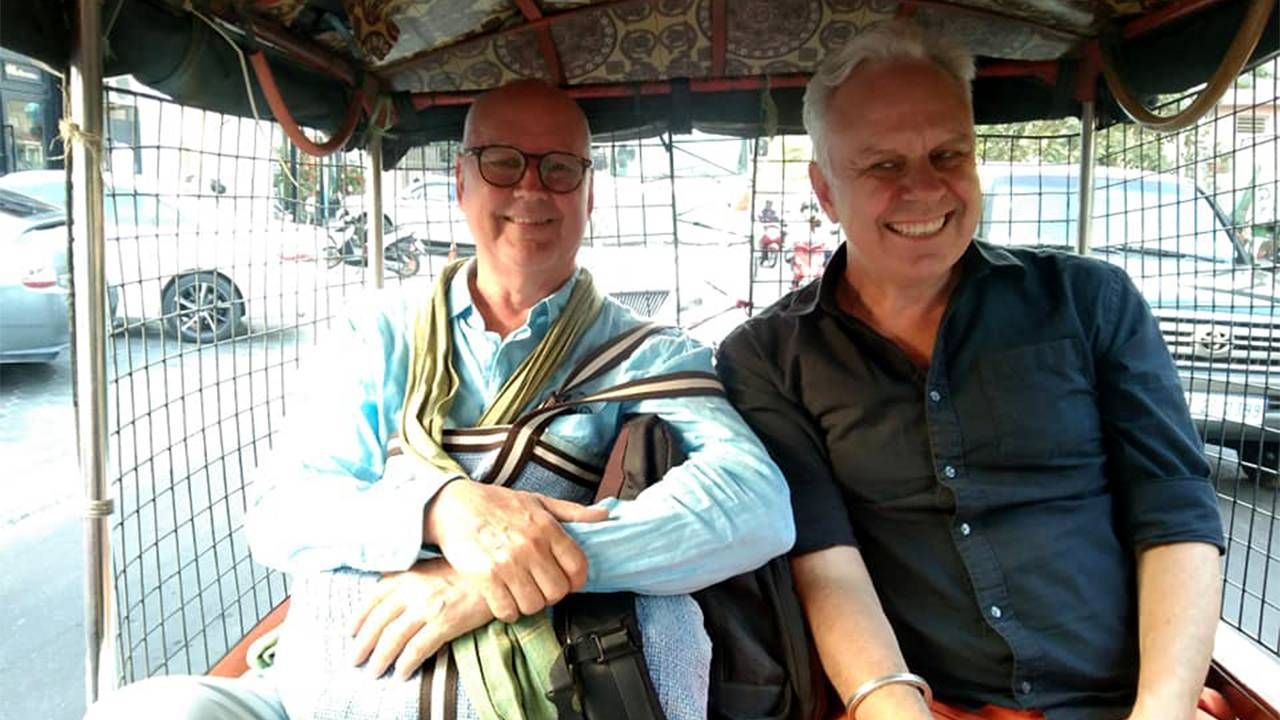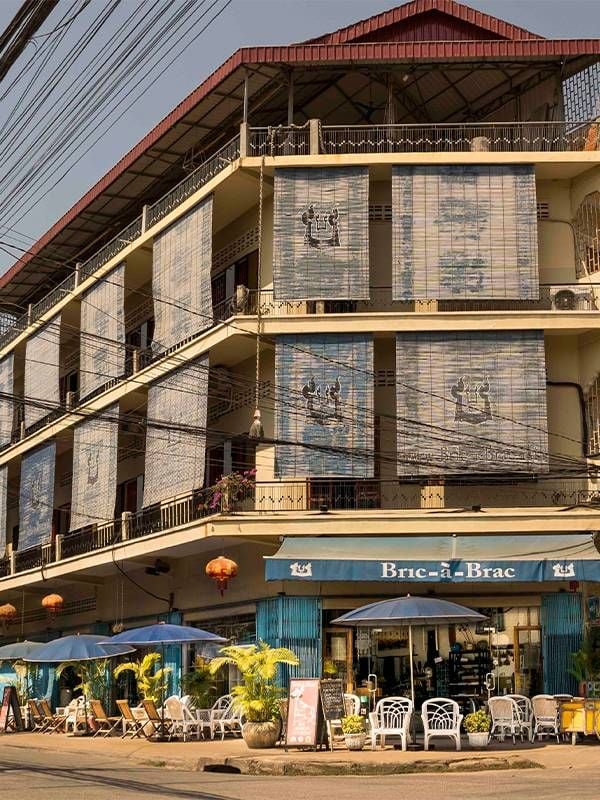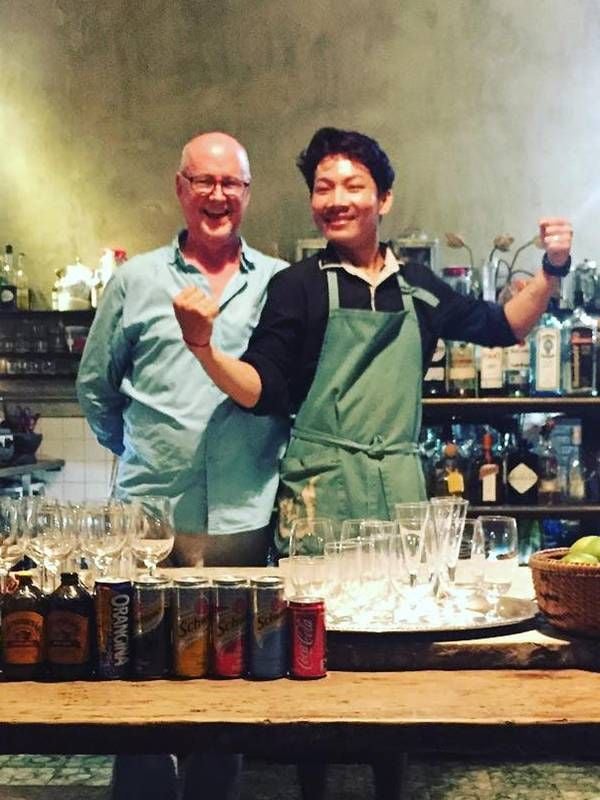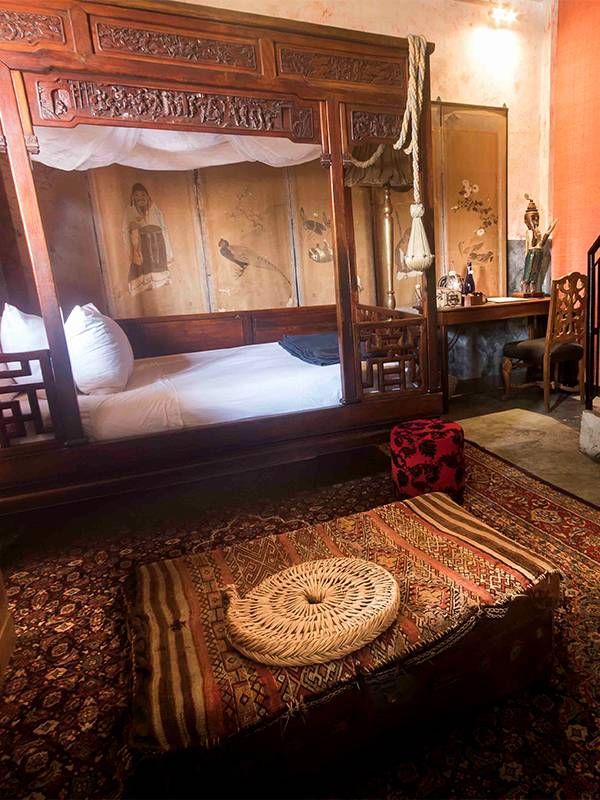When the Pandemic Shut Their Second-Act Business
This couple had big plans for their Cambodia B&B. Then, COVID-19 arrived.
At an age when other people might be thinking of retirement, Robert Carmack and Morrison Polkinghorne, now 68 and 55, moved from Sydney, Australia to Cambodia in 2014 with a dream and a plan.

The goal was to lower their expenses and operate three well-established businesses from overseas. Polkinghorne, an Australian textile designer who produced extravagant handmade trimmings and tassels, would employ local labor. Carmack, an American-born food stylist and French-trained chef who's written five cookbooks, would fly back to Australia for film shoots. And together they would continue The Globetrotting Gourmet — a decade-long venture leading Southeast Asian culinary tours.
Carmack and Polkinghorne created a guesthouse that seemed to be plucked from the pages of a Somerset Maugham novel.
As the base for this new lifestyle they chose Battambang — a city in the northwest part of Cambodia that had a dynamic arts scene and felt like a provincial village. (Its colonial center so closely resembles Phnom Penh of the 1970s, that Angelina Jolie did a location shot there for her film "First They Killed My Father " about a family forced into rural exile during the genocidal regime of Pol Pot.)
To house themselves, their enterprises and a shipping container's worth of belongings, the couple took a 10-year lease on a dilapidated modern building, one block from the Art Deco market. It was roughly the size, at a fraction the rent, of the inner-city warehouse in Sydney where they'd been paying $4,000 per month.
A Change of Plans
Cambodians, who are accustomed to living with entire families in one room, immediately scoffed at just two people occupying a three-story dwelling. Embarrassed, the newcomers regrouped. Employing 22 locals in a seven-month renovation, Carmack and Polkinghorne created a guesthouse that seemed to be plucked from the pages of a Somerset Maugham novel.

Seated in wicker chairs at a sidewalk bar, guests would sip complimentary gin-and-tonics and nibble on paté and imported French cheeses. The two upper floors included an atelier for Polkinghorne; their living quarters and three guest rooms with furnishings befitting of the establishment's name, Bric-à-Brac.
Bespoke service by an English-speaking staff of 12 Cambodians in their 20s led to enthusiastic reviews from travelers and a fistful of hospitality awards.
So, the B&B's followers were surprised to see a February 13 post on Bric-à-Brac's Facebook page that read: "Will the last person leaving Battambang please turn off the light." Beneath it was a photo of a lantern-style fixture dangling from the ceiling of an empty room.
As Cambodia tourism waned during the second half of 2020, due to the pandemic, the owners had barely broken even. Seeing no bookings for last Christmas or the high season during the two months after that (when they were typically full) the owners decided to repatriate to Australia.
"There was no opportunity to sell a failed hotel business with no hope of renewal for at least another two-to-three years. So, we basically had to say goodbye to it all," Carmack said.
Shutting Down Their Cambodian B&B
Having dipped into their savings for renovations and later for upgrades — to improve bathrooms and buy pure linen sheets, for example – they hadn't quite recouped their investment at the time of their COVID-19 shutdown. (Just one year earlier, my husband and I spent five nights at Bric-à-Brac; we paid our own way and traveled incognito.)
I caught up with the former hoteliers by Zoom this spring during their 14-day quarantine at the Mercure Sydney Hotel. Most of their belongings were en route in a 40-foot container. They were about to start from scratch — again. And this time, in a downscaled version of their life.

As Bric-à-Brac blossomed before the pandemic, the couple's other businesses had faded. Polkinghorne had only one commission after the move, employing eight Cambodian women he'd trained to fill the order. Carmack's sole food-styling assignment during their seven years in Battambang was assembling the fantasy banquet scene for Jolie's movie. They did just two more food tours after relocating.
Though it's hard to pinpoint exactly what went wrong with each enterprise, the men said long hours running Bric-à-Brac diverted energy from marketing the others.
At the B&B, cultural differences created personnel challenges.
For example, employees sometime didn't show up for work if it was raining (in a country where the wet season lasts for six months). One day, a worker phoned to say he couldn't come in because his father's cow was missing.
But strong bonds developed with those who weren't lost to turnover. That made the pandemic setbacks "hard for everybody," said Carmack.

Among those they nurtured: Mok Vannak, 28, a rice farmer the couple had sent to the prestigious Cambodian hospitality school École d'Hôtellerie et de Tourisme Paul Dubrule. In a photo taken with Vannak's mother at her son's September 2019 graduation from the program, Carmack and Polkinghorne are beaming.
But after returning to his family's farm when the pandemic began, Vannak cut off contact with his former bosses for nine months. "It was kind of like losing a friend or a son," Carmack said, choking back tears.
Vannak, who got a job in a tile store, ultimately apologized and took a nine-hour bus ride to attend a farewell dinner with the men in Phnom Penh. "That meant a lot to me," Carmack said. Dit Saruon, 23, another former employee who went to see them off, has taken the civil service exam and become a policeman.
Their New Life in Australia
In Cambodia, Carmack and Polkinghorne either got around in three-wheel motorized taxis called tuk-tuks or hired a car and driver. But they'll cross the next milestone in a 20-year-old Toyota Camry purchased from a friend.
In April, the couple bought a historic 1920s church in Murrayville, Victoria Australia. They plan to turn it into living and studio space.
Polkinghorne expects to become the breadwinner, perhaps getting a part-time job and producing income from his art.
Polkinghorne expects to become the breadwinner, perhaps getting a part-time job and producing income from his art.
While living in Battambang, he brewed ink by combining rainwater collected during the monsoon with lotus petals discarded at Buddhist temples. By dipping lotus stems into that liquid, he produced about 200 pointillist abstract scenes from Cambodia. The largest, titled "Delta Square," was purchased by a New York interior designer in 2019 when she stayed at Bric-à-Brac. Others have been exhibited in Bangkok and Phnom Penh.
In their shipping container along with their belongings were six liters of ink. That's enough, Polkinghorne figures, to last for five years. And he has no shortage of ideas about how to use it, if everything goes as planned.
Editor’s note: This article is part of "America's Entrepreneurs," a Next Avenue initiative made possible by the Richard M. Schulze Family Foundation and EIX, the Entrepreneur Innovation Exchange.

